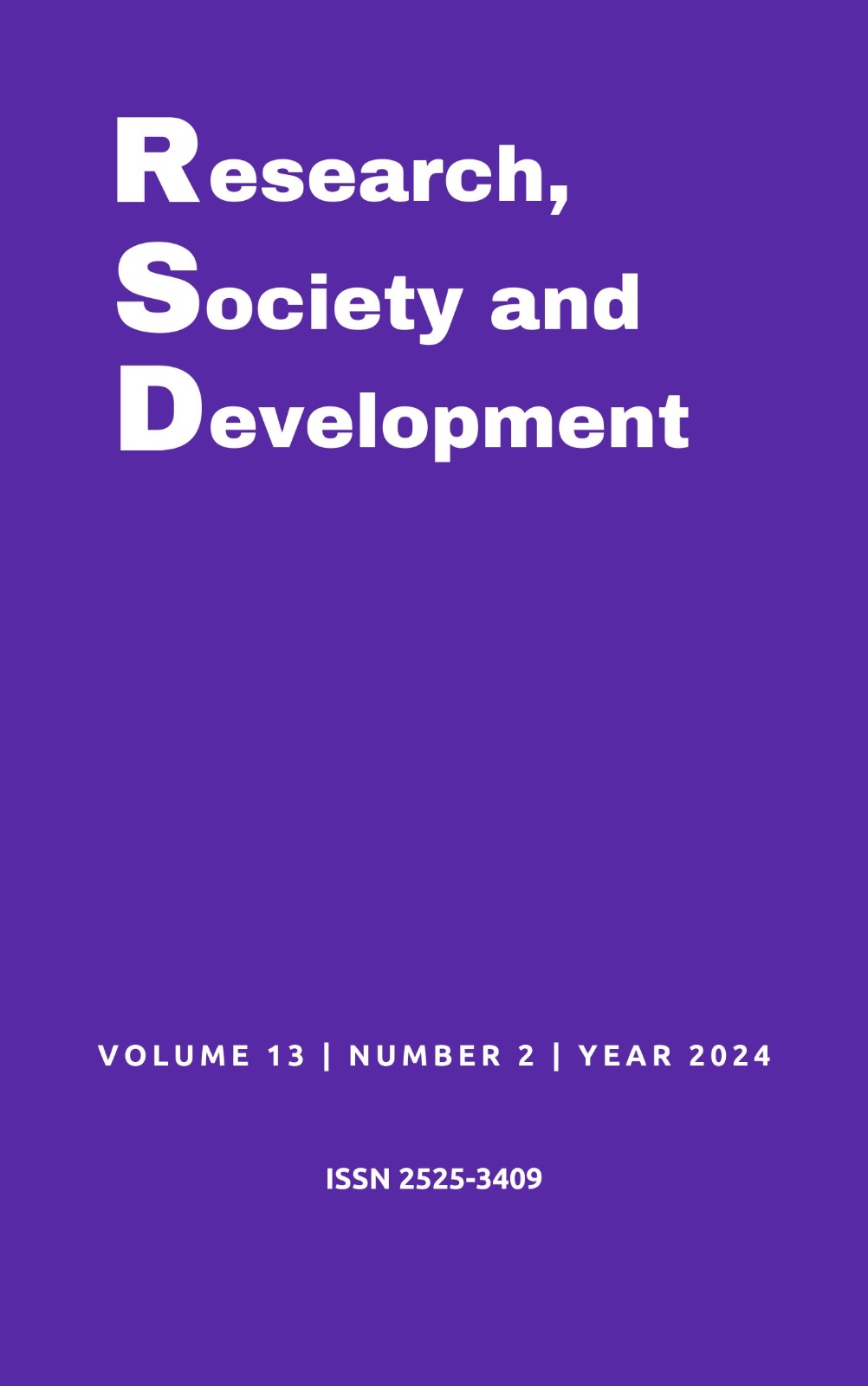El papel de la microbiota intestinal en el desarrollo de la depresión: Protocolo de revisión del alcance
DOI:
https://doi.org/10.33448/rsd-v13i2.45003Palabras clave:
Microbiota intestinal, Depresión, Eje intestino-cerebro, Inflamación.Resumen
El presente trabajo es un protocolo de revisión del alcance del papel de la microbiota intestinal en el desarrollo de la depresión. Su objetivo fue identificar la relación entre la microbiota intestinal y la disbiosis provocada por la depresión. Se basó en la metodología del Joanna Briggs Institute (JBI), y estuvo guiado por la pregunta de revisión en términos del modelo conceptual: Población, Concepto y Contexto - PCC. El estudio se realizará según las bases de datos Lilacs, Google Scholar y Pubmed. El autor desarrollará una tabla en el software GoogleDocs para extraer y organizar datos. La identificación de datos se llevará a cabo en el software Rayyan® por dos grupos de revisores independientes y un crítico. Los resultados se mostrarán en un diagrama de flujo, enfatizando el proceso de investigación e incluyendo: identificación, selección, elegibilidad e inclusión de la literatura estudiada.
Referencias
Almeida, G. F., Carvalho, P. R., & Lopes, P. C. (2020). Intestino e humor: revisão bibliográfica sobre moduladores intestinais associados aos polifenóis no tratamento da depressão. Id on Line Revista Multidisciplinar, 14(50). https://doi.org/10.14295/idonline.v14i50.2492
Andersson, J. (2020). Is there a Connection Between the Gut-Microbiota and Major Depression? http://urn.kb.se/resolve?urn=urn:nbn:se:his:diva-19150
Bercik, P, Collins, S. M, & Verdu, E. F. (2012). Microbes and the gut-brain axis. Neurogastroenterology and motility, 24(5), 405–413. https://doi.org/10.1111/j.1365-2982.2012.01906.x
Bergström, A., Skov, T. H, Bahl, M. I, Roager, H. M, Christensen, L. B, Ejlerskov, K. T., Mølgaard, C, Michaelsen, K. F, & Licht, T. R. (2014). Establishment of intestinal microbiota during early life: a longitudinal, explorative study of a large cohort of Danish infants. Applied and environmental microbiology, 80(9), 2889–2900. https://doi.org/10.1128/AEM.00342-14
Esteves, F. C., & Galvan, A. L. (2006) Depressão numa contextualização contemporânea. Aletheia, Canoas, (24), 127-135. <http://pepsic.bvsalud.org/scielo.php?script=sci_arttext&pid=S1413-03942006000300012&lng=pt&nrm=iso>. acessos em 08 fev. 2024.
Guedes, et al. (2020). Psicobióticos na saúde mental contra transtorno da ansiedade e depressão. Ciências da Saúde: Campo Promissor em Pesquisa, 7, 107-112. de Jonge W. J. (2013). The Gut's Little Brain in Control of Intestinal Immunity. ISRN gastroenterology, 2013, 630159. https://doi.org/10.1155/2013/630159
Joanna Briggs Institute, (JBI). Manual for evidence synthesis. 2020. JBI. https://doi.org/10.46658/JBIMES-20-01
Landeiro, J. A. V. R. (2016). Impacto da microbiota intestinal na saúde mental. http://hdl.handle.net/10400.26/17565
Lanxiang Liu, et al. (2023) Gut microbiota and its metabolites in depression: from pathogenesis to treatment. https://doi.org/10.1016/j.ebiom.2023.104527
Liang, S, Wu, X, Hu, X, Wang, T, & Jin, F. (2018). Recognizing Depression from the Microbiota⁻Gut⁻Brain Axis. International journal of molecular sciences, 19(6), 1592. https://doi.org/10.3390/ijms19061592
Lozupone, C. A., Stombaugh, J. I., Gordon, J. I., Jansson, J. K., & Knight, R. (2012). Diversity, stability and resilience of the human gut microbiota. Nature, 489(7415), 220–230. https://doi.org/10.1038/nature11550
Orsolini, L., Pompili, S., Tempia Valenta, S., Salvi, V., & Volpe, U. (2022). C-Reactive Protein as a Biomarker for Major Depressive Disorder? International Journal of Molecular Sciences, 23(3), 1616. https://doi.org/10.3390/ijms23031616
Ratto, R. da S, Afonso, M. dos S, Bampi, S. R, Peter, N. B, Raphaelli, C. de O, & Ratto, C. G. (2020). Relatioship between intestinal microbiotes and depression. Research, Society and Development, 9(12), e42191211158. https://doi.org/10.33448/rsd-v9i12.11158
Souzedo, F. B, Bizarro, L, & Pereira, A. P. A. (2020). O eixo intestino-cérebro e sintomas depressivos: uma revisão sistemática dos ensaios clínicos randomizados com probióticos. Jornal Brasileiro de Psiquiatria, 69(4), 269–276. https://doi.org/10.1590/0047-2085000000285
Sonnenburg, E. D., Smits, S. A., Tikhonov, M., Higginbottom, S. K., Wingreen, N. S., & Sonnenburg, J. L. (2016). Diet-induced extinctions in the gut microbiota compound over generations. Nature, 529(7585), 212–215. https://doi.org/10.1038/nature16504
World Health Organization. (2017). Aumenta o número de pessoas com depressão no mundo. https://www.paho.org/pt/noticias/23-2-2017-aumenta-numero-pessoas-com-depressao-no-mundo
Yatsunenko, T., Rey, F. E., Manary, M. J., Trehan, I., Dominguez-Bello, M. G., Contreras, M., Magris, M., Hidalgo, G., Baldassano, R. N., Anokhin, A. P., Heath, A. C., Warner, B., Reeder, J., Kuczynski, J., Caporaso, J. G., Lozupone, C. A., Lauber, C., Clemente, J. C., Knights, D., Knight, R., & Gordon, J. I. (2012). Human gut microbiome viewed across age and geography. Nature, 486(7402), 222–227. https://doi.org/10.1038/nature11053
Descargas
Publicado
Número
Sección
Licencia
Derechos de autor 2024 Raissa Fiorese Procópio Faim; Gustavo Henrique Tinen; Isabelle de Genaro Lima; Evandro Delmondez Oliveira; Maria Clara Gonçalves Rocha; Kamilly Lima do Vale; Luan Diego Marques Teixeira

Esta obra está bajo una licencia internacional Creative Commons Atribución 4.0.
Los autores que publican en esta revista concuerdan con los siguientes términos:
1) Los autores mantienen los derechos de autor y conceden a la revista el derecho de primera publicación, con el trabajo simultáneamente licenciado bajo la Licencia Creative Commons Attribution que permite el compartir el trabajo con reconocimiento de la autoría y publicación inicial en esta revista.
2) Los autores tienen autorización para asumir contratos adicionales por separado, para distribución no exclusiva de la versión del trabajo publicada en esta revista (por ejemplo, publicar en repositorio institucional o como capítulo de libro), con reconocimiento de autoría y publicación inicial en esta revista.
3) Los autores tienen permiso y son estimulados a publicar y distribuir su trabajo en línea (por ejemplo, en repositorios institucionales o en su página personal) a cualquier punto antes o durante el proceso editorial, ya que esto puede generar cambios productivos, así como aumentar el impacto y la cita del trabajo publicado.


